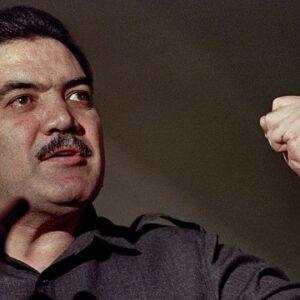From 1987 to 1992, Mohammad Najibullah was the President of Afghanistan. When the mujahideen took control of Kabul, he was deposed. Despite being the de-facto dictator of Afghanistan for five years, the bulk of the international community did not recognize his authority. Najibullah graduated from medical school but never worked as a doctor. He joined the People’s Democratic Party of Afghanistan at the age of 18 and soon rose through the ranks, serving as a bodyguard for one of the party’s top leaders. Najibullah then went on to lead the Afghan intelligence organization KHAD with Soviet help for a number of years, and his performance for the agency was praised, despite his reputation for ordering indiscriminate torture of opponents. His greatest achievement, however, was establishing himself as the leader of the People’s Democratic Party of Afghanistan, which he utilized as a stepping stone to becoming the country’s de-facto dictator. Najibullah’s leadership in Afghanistan was widely reviled because he stifled free speech and converted the Marxist People’s Democratic Party of Afghanistan into a Muslim one. His regime was reliant on the Soviet Union for help. His demise was precipitated by the fall of the Soviet Union and the internal breakdown of his regime.
Childhood and Adolescence
Mohammad Najibullah Ahmadzai was born in the Afghan province of Paktia in February 1947. His father, Akhtar Mohammad Khan, worked as a trade delegate for the Afghan government in Pakistan, and the family had a comfortable lifestyle.
Najibullah was born and raised in Kabul, Afghanistan’s capital, and attended Habibia High School in the city. Following that, he attended the St. Joseph’s School in Baramulla, Kashmir.
Mohammad Najibullah enrolled in Kabul University to study medicine after completing his high school education. His medical degree was awarded to him in 1975. He had joined the People’s Democratic Party of Afghanistan, a communist organization, ten years before graduating from university.
The Career of Mohammad Najibullah
Mohammad Najibullah served as the bodyguard and advisor of one of the People’s Democratic Party’s elected representatives during his time with the party. It placed him closer to the party’s leadership, and he was elected to the Central Committee in 1977.
Mohammad Najibullah was appointed Afghan Ambassador to Iran when the People’s Democratic Party of Afghanistan came to power in Afghanistan in 1978. However, within the party, a power battle erupted between the Parcham, to which Najibullah belonged, and the Khalq. He was sacked and sent into exile in Eastern Europe the same year.
Mohammad Najibullah returned to Afghanistan in 1979 after the Russians created a government dominated by the Parcham group of the People’s Democratic Party of Afghanistan, after spending a year in exile. Najibullah was named the head of KHAD, the Afghan intelligence organization. He was elected to the Politburo of the People’s Democratic Party of Afghanistan two years later.
The spy service grew brutally efficient under Mohammad Najibullah’s direction, which gained the attention of the Soviet authorities. In 1986, the KHAD was transformed into a ministry, and he became the General Secretary of the People’s Democratic Party of Afghanistan in the same year.
On September 30, 1987, Mohammad Najibullah seized power and effectively became the President of Afghanistan, with full assistance from the Soviet Union. During his presidency, he said that the members of the People’s Democratic Party of Afghanistan were no longer Marxists and that they were all Muslims.
Najibullah stifled free expression and only permitted political parties to run in elections if they did not espouse beliefs that he disagreed with. He established the Islamic State in Afghanistan.
With the breakup of the Soviet Union in 1991, foreign help to his administration dried out, signaling Najibullah’s demise. He was deposed from power in 1992 and stopped from departing the country. He sought safety at the UN compound in Kabul, where he remained until 1996.
Mohammad’s Major Projects
Despite claims of weak governance during his presidency, Mohammad Najibullah is recognized as one of the best commanders of the Afghan intelligence agency, the KHAD, and his work for the agency helped keep the country safe from external threats.
Personal History and Legacy
Dr. Fatana Najib married Mohammad Najibullah. They had three daughters together.
Mohammad Najibullah had assumed that because he was a refugee residing within the UN compound in Kabul, he would not be assaulted by his adversaries, but the Taliban raided the compound on September 28, 1996. He was said to have been castrated, carried through the streets, and then hanged in broad daylight.
Estimated Net worth
Mohammad Najibullah has a net worth of $ USD 3 million and earns a living as a physician, diplomat, gynecologist, and politician.


